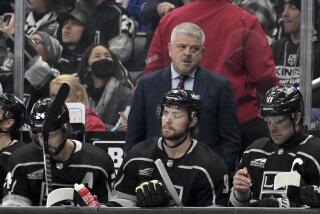‘It’s a Sad Day,’ Says Gretzky : Hockey: He says the hardest part is striking against owner Bruce McNall, but he thinks it’s important to overcome inaction of past years.
- Share via
On the surface, it was like any other day for the Kings at their Culver City practice rink.
The shiny new cars pulled up, the athletes got out, and the young autograph hounds surged forward. The players signed pucks, posters and pennants before disappearing inside to attend to business.
But Wednesday, it was hardly business as usual. They found their training room closed, their equipment locked away.
No matter.
They weren’t there to skate, but to deliberate.
For two hours, the Kings talked about the labor dispute that has brought their sport to a crisis point, reviewed the latest proposal by the owners, watched a video from Bob Goodenow, head of their union, then voted to join their brethren on the 21 other NHL clubs in approving a strike.
After tallying the votes, the Kings emerged from their meeting room to face their sure-to-be-unhappy fans.
“It looks like we’re out of work,” wing Luc Robitaille said. “It’s really weird. Once you’re in it, you’re in it. We have no choice.”
Goalie Kelly Hrudey said he was “hoping for a quick resolution, but I’m planning for a long time.”
The most visible figure among all 564 players will be the highest paid, the Kings’ Wayne Gretzky, who doesn’t expect any sympathy for losing $16,666.67 in salary each day the strike goes on this week.
“I don’t get paid next week, and it’s a big check (he makes about $117,000 a week), but it’s all relative,” Gretzky said. “I understand where the fans are coming from. I know there’ll be no sympathy for our side. There’ll be no sympathy for the owners. There’ll be no sympathy either way. The sport will be tarnished. But I understand that people like me and Mess (Mark Messier) and (Mario) Lemieux are going to take the brunt of the criticism. People are going to say, ‘See, they are not good people. They are sticking it to the NHL.’ “It’s a sad day. Let’s be honest. It’s pretty scary.”
But the reaction in Los Angeles, where the culmination of the NCAA basketball tournament, the NBA playoffs and the start of the baseball season will soon arrive to soothe the sports-starved fans, pales in comparison to the feelings in Canada, where hockey is the national pastime. And for many, the only pastime.
“You can’t describe it,” said Gretzky, rolling his head back at the thought of how the news of hockey’s first work stoppage would be received in his native country. “You can’t understand it. You have no idea.”
To explain the strike, Gretzky compared the action of the players Wednesday with the inaction of his predecessors.
“I hear old-timers complaining,” he said, “because when they played 30 years ago, they didn’t have a good pension plan. We’re not going to be complaining 30 years from now. We’re doing it now.”
Gretzky doesn’t mind taking responsibility for his decision to go on strike, but refuses to accept responsibility for his fellow players.
“What people have to understand,” he said, “is that this is 560 players, not just Wayne Gretzky. I can’t say that if I vote no on the strike, 560 others would change their votes. It’s not going to happen.
“I’ve had pressure since I’ve been in the NHL. This is just another thing. But to stand here and say I’m not uncomfortable, that’s probably a lie.”
Gretzky said the hardest part is striking against owner Bruce McNall, his close friend and partner in several other ventures including the ownership of the Toronto Argonauts of the Canadian Football League.
“He’s been so good to us,” Gretzky said, “and people are going to say, ‘Now that Wayne Gretzky has a chance to stick it to him, he’s going to stick it to him.’ ”
But asked if he had ever considered crossing the picket line, Gretzky shook his head emphatically.
“I can’t,” he said softly. “I just can’t.”
Later at a Forum news conference, McNall criticized the striking players, including his own.
“I don’t understand why players would go out on a work stoppage now,” he said, “in light of how close everybody seems to be on these issues. I think it’s pure mistrust and misunderstanding.
“When I talked to the players, I asked them, ‘Tell me what you’re striking about?’ I couldn’t get any clear answers.
“A union by definition should be concerned with three things--wages, benefits and the conditions of employment. So my question to the players would be simply: Where’s your problem? Is anybody unhappy with their salaries in light of what’s happened over the last couple of years? Are there any benefits they’re lacking? I don’t think so. And the conditions of employment? Are they working in the mines or something? Are you unhappy? You don’t like the Caesar’s salad on the plane? I don’t get it. That’s my problem. I just don’t get it.”
More to Read
Go beyond the scoreboard
Get the latest on L.A.'s teams in the daily Sports Report newsletter.
You may occasionally receive promotional content from the Los Angeles Times.






